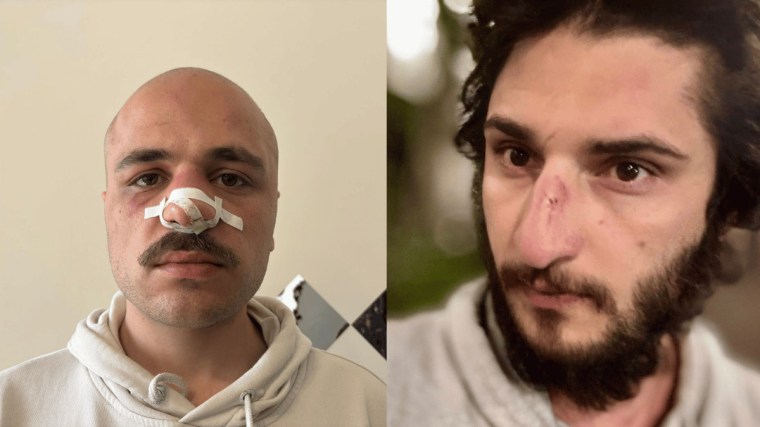Stockholm, April 19, 2024—The Georgian Parliament should reject a draft law that would designate media outlets as “foreign agents,” and the authorities should investigate allegations of police brutality against journalists, hold those responsible accountable, and protect media members reporting on the ongoing protests, the Committee to Protect Journalists said on Friday.
On April 17, the Georgian Parliament passed a first reading of the “On Transparency of Foreign Influence” bill, according to news reports.
The bill, reintroduced by the ruling Georgian Dream party earlier this month after mass protests forced its withdrawal last year, would require nonprofits and media outlets receiving more than 20% of their funding from abroad to join a registry of “organizations pursuing the interests of a foreign power.”
During protests against the bill on the night of April 16, riot police assaulted at least four journalists covering them, according to independent trade group Georgian Charter of Journalistic Ethics, and the journalists, who spoke to CPJ by telephone and messaging app.
“Georgia’s ruling party looks intent on rushing through ‘foreign agent’ legislation as a tool to brandish against critical media ahead of the October parliamentary elections,” said Gulnoza Said, CPJ’s Europe and Central Asia program coordinator, in New York. “It would be better if authorities in Georgia showed a commitment to European democratic standards by swiftly investigating allegations of police violence against journalists covering mass protests against the bill and bringing those responsible to justice.”
In an April 17 statement following the bill’s first reading, the European Union delegation to Georgia said that the law “is not in line with EU core norms and values” and its final adoption “would negatively impact Georgia’s progress” in its bid to join the EU.
The proposed legislation would require externally-funded organizations to provide detailed annual accounts, including information about the source, amount, and purpose of any funds received or spent, for a publicly available register. Organizations that fail to register or to provide such data would be subject to fines of 25,000 lari (US$9,500) and monthly fines of 20,000 lari ($7,500) for continued non-compliance.
Georgia’s pro-EU President Salome Zourabichvili, who has previously promised to veto the law, told CNN on April 18 that the law is an “exact duplicate” of Russia’s ‘foreign agent’ law “that was adopted a few years ago [in Russia] and then complemented in order to crush civil society.” Georgian Dream controls a majority large enough to override a presidential veto and has vowed to pass the law by the end of the current parliamentary session in June.
Giorgi Baskhajauri, a reporter for independent news website Aprili, told CPJ that he was covering the mass demonstrations against the draft law near Georgia’s parliament, reportedly attended by about 20,000 people, at around 1:15 a.m. on April 17, when riot police, rushing at protesters, shoved him to the ground and repeatedly kicked and punched him in the head. The journalist sustained a broken nose and underwent minor surgery following the attack, he said.
Baskhajauri said he is sure police knew he was a journalist because he had been standing in front of them, wearing his press badge clearly on his chest and taking photos for around 30 minutes before the incident, and because he shouted that he was a journalist during the assault.
Giorgi Badridze, a reporter for independent Tabula news site, told CPJ that he was filming riot police rushing protesters with his cell phone at around 1 a.m. on April 17 when at least three police officers grabbed and tossed his phone, pushed him to the ground, and multiple officers dragged him across the asphalt and kicked him in the legs for up to one minute. Badridze said he sustained scratches and light bruising. Later that morning, Badridze was filming police chasing demonstrators with a second cell phone but officers again grabbed the phone from him, returning it shortly afterwards, according to the journalist and footage of the incident posted by Tabula on Facebook.
Aleksandre Keshelashvili, a reporter for the independent news outlet Publika, was filming riot police chasing protesters at around the same time when two officers pushed him against a wall, and one hit him in the face with his hand, according to footage of the incident published by Publika on Facebook and the journalist, who told CPJ he sustained minor bruising to the temple. Shortly afterwards, police snatched his phone from him, as he continued to film, but returned it to him quickly, he said.
Nurlan Gahramanli, an independent Azerbaijani journalist, was filming riot police beating protesters when an officer grabbed his phone and threw him to the ground, despite him repeatedly shouting that he was a journalist, according to the Gahramanli and footage of the incident that he posted on X. Gahramanli told CPJ that three or four officers then surrounded him. One of them struck him on the nose with a baton, and another punched him in the face, causing him to sustain swelling, bruising and scratches on his nose and face.
Badridze and Keshelashvili told CPJ they were wearing clearly displayed press badges, and they believe police were aware that they were journalists.
All four journalists have filed complaints with Georgia’s Special Investigation Service (SIS), which investigates allegations of alleged crimes by law enforcement officers and crimes against journalists, they told CPJ.
CPJ emailed the Ministry of Internal Affairs of Georgia and messaged the SIS on its Facebook page for comment but did not receive any replies.
